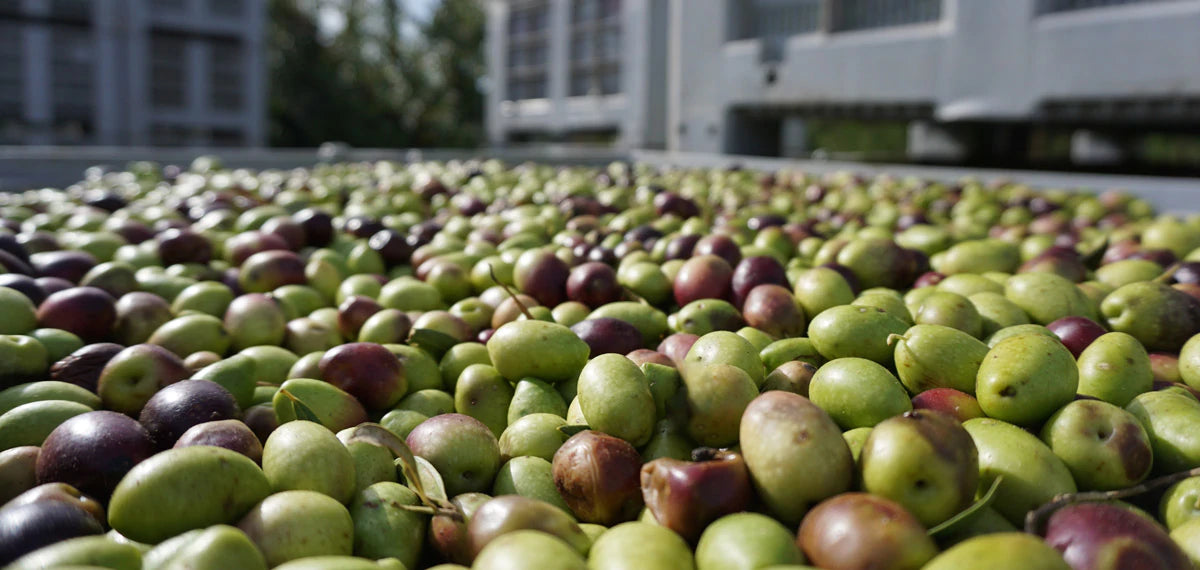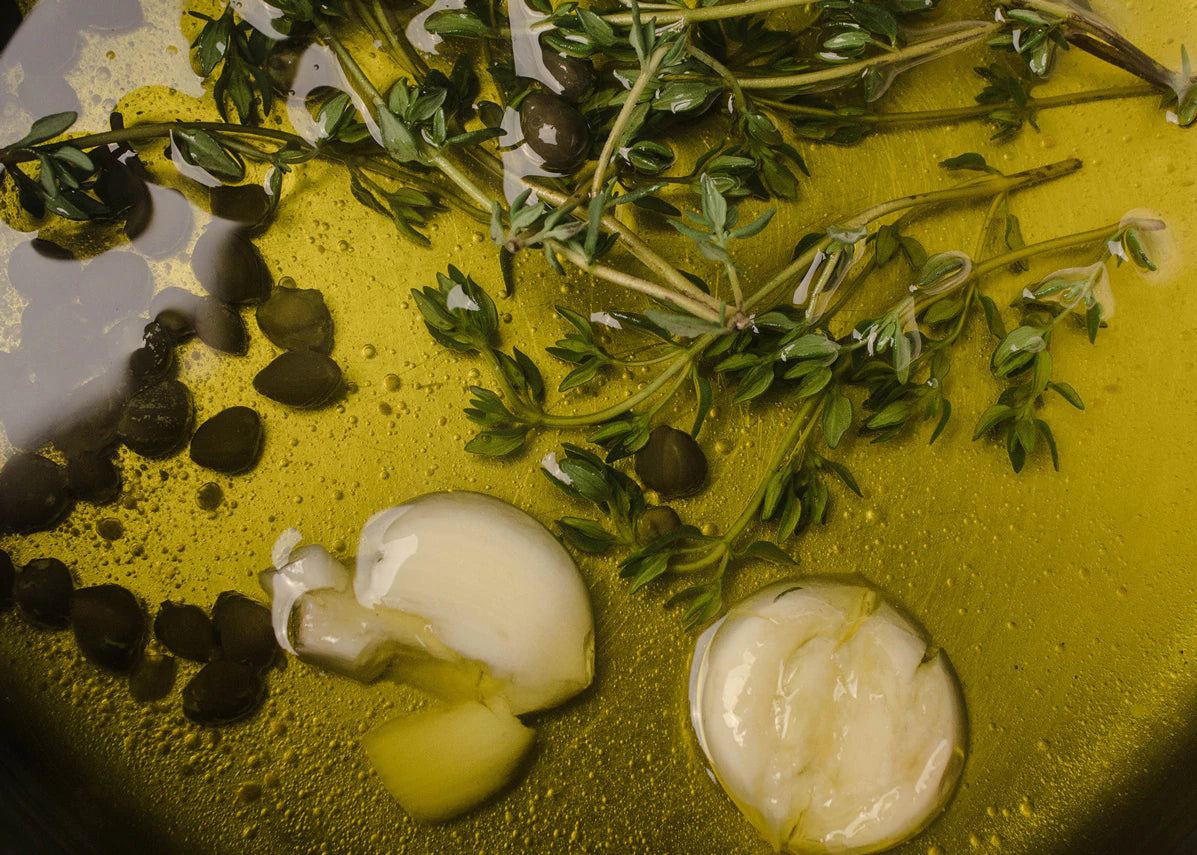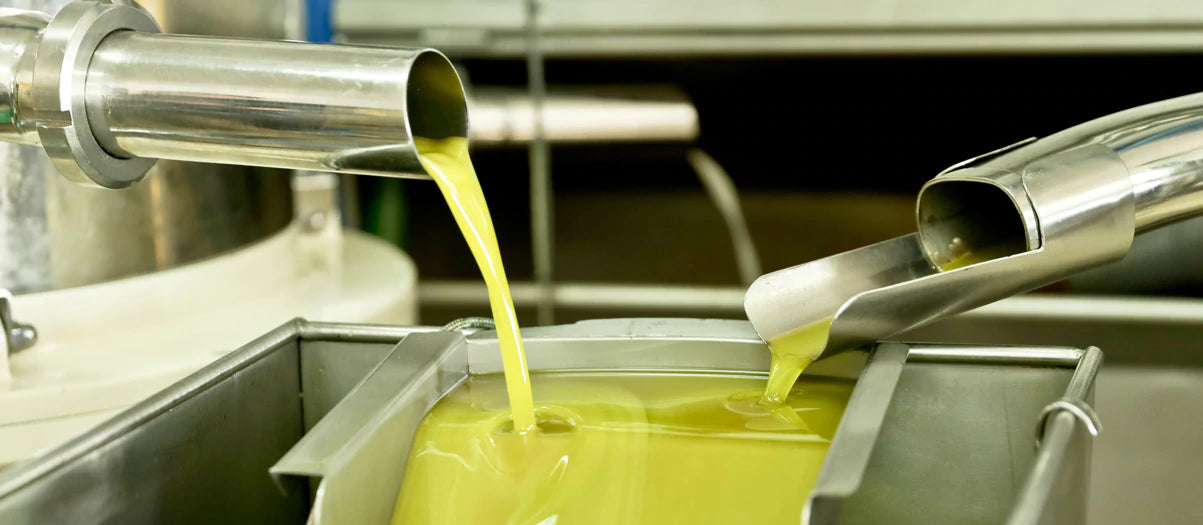- Home
- Our Journal
- About EVOO Health Benefits Of Olive Oil
Health Benefits Of Olive Oil
Posted by Olive Oil Lovers on

Olive oil is undoubtedly the healthiest fat. While some people suggest never consuming oils of any kind, the evidence is clear that when choosing a food oil for marinating, dressing, and cooking, extra virgin olive oil is always the healthiest choice.
Extra virgin olive oil vs. other oils
Extra virgin olive oil is simply the juice of the olive fruit with its water removed by centrifuge, an unrefined, all-natural product created without heat or chemicals involved in any step of the process.
Besides extra virgin olive oil and unrefined virgin coconut oil, every other common food oil requires chemical processing. All vegetable oils, including corn oil, peanut oil, and canola oil, are extracted from seeds using high heat along with industrial solvents, such as Hexane, a chemical the EPA has identified as a neurotoxin in rat studies.
Seed oils created by chemical extraction must still be bleached and deodorized in order to make them edible, and these processes destroy any natural nutrients while also producing free radicals that can contribute to a host of diseases when these oils are consumed.
The latest study indicating the dangers of vegetable oils - released in the summer of 2019 and performed by UMass Amherst - suggested that consumption of these refined polyunsaturated fry oils exacerbates symptoms for people with diseased colons.
Research shows that replacing any of these processed, polyunsaturated fats in your diet with the monounsaturated fats found in extra virgin olive oil can aid weight loss and improve overall health.
Furthermore, extra virgin olive oil has many proven health benefits as a result of the oil’s high content of polyphenols. These valuable antioxidants cannot be found in any other edible oil.
A Proven Medicine
Nutrient-dense EVOO contains many different polyphenolyic compounds that offer myriad benefits to human health, including “antioxidant, antimicrobial, hypoglycemic, vasodilator and antihypertensive effects.”
1. EVOO provides similar benefits to caloric restriction
Plant polyphenols, including those found in extra virgin olive oil, have properties that mimic the effects of caloric restriction on the body, specifically by affecting the activity and levels of sirtuins, a family of proteins that regulate cellular health. Caloric restriction in humans has shown many beneficial effects, like prolonging lifespan and reducing the risk of age-associated diseases.
2. Reduces inflammation and relieves rheumatoid arthritis symptoms
EVOO has shown that it can decrease systemic inflammation. By inhibiting the activity of specific enzymes that cause inflammation, the oleocanthal in EVOO helps improve health outcomes, as inflammation is a known factor across a variety of chronic diseases.
Some evidence suggests extra virgin olive oil can reduce the pain, inflammation and oxidative stress associated with rheumatoid arthritis. Patients taking fish oil also showed significant improvements when their diets were supplemented with extra virgin olive oil.
3. Offers exciting results for the fight against cancer
The polyphenols found in EVOO have shown to have a debilitating effect on cancer cells, both in reducing cell proliferation and increasing cell death. EVOO’s polyphenols appear to be particularly effective against breast cancer cells, and may also kill skin cancer cells without harming healthy cells.
4. Repairs the body and combats aging
EVOO polyphenols stimulate autophagy, the body’s system of clearing out dead cells and creating new cells, suggesting plant phenols to be a potent weapon against neurodegeneration. Scientists writing in the International Journal of Molecular Science found that “EVOO polyphenols can be considered a new family of plant-produced gerosuppressants... leading to prevention against aging and age-related diseases, including cancer.”
5. Interferes with processes leading to amyloid diseases
Symptoms of amyloid diseases show correlation with diabetes and also neurodegenerative diseases like Alzheimers. EVOO polyphenols appear to reduce accumulation and buildup of the amyloid proteins associated with Alzheimers, with one study finding diminished chances of cognitive deficit for those who used extra virgin olive oil vs. those who did not. The same study found that those in the EVOO-consuming cohort had lower incidence of stroke, as well as reduced risk of cardiovascular disease and CVD-related mortality.
6. Improves cardiovascular health
Many studies have found extra virgin olive oil to be very beneficial for cardiovascular health. The polyphenols in EVOO lower the risk of heart disease, lower LDL cholesterol levels as well as total cholesterol levels, and help prevent the formation of plaque in arteries. A new study released in 2021 determined that people who replace unhealthy fats in their diet with olive oil can lower their risk of cardiovascular failure by almost 20%. The same study found that a higher olive oil intake was associated with a lower risk of total and cause-specific mortality.
7. Improves obesity outcomes
Several plant phenols show the ability to combat obesity-related conditions. Consumption of EVOO polyphenols can help reduce food intake and fat tissue accumulation by better regulating proper cell function, a process which also helps reduce obesity-related inflammation.
Obesity has high correlation with both cardiovascular disease and also type-2 diabetes. The polyphenols found in extra virgin olive oil have been shown to improve fat metabolism and insulin sensitivity, while also helping to balance blood sugar levels. Typically the body stores fat in cells called adipocytes. In obese individuals, extra virgin olive oil can help prevent lipotoxicity and cell death when fatty acids get stored in non-adipose tissues.
EVOO can also help improve liver health related to metabolic syndrome, and protect against nonalcoholic fatty liver disease by alleviating oxidative stress and improving inflammatory response.
8. Shows antibacterial properties
Studies show that olive oil can destroy bacteria associated with ulcers and stomach cancer. Strains of the bacteria Helicobacter pylori have shown some antibiotic resistance. In tests extra virgin olive oil was able to eradicate all strains of the bacteria, including those with antibiotic resistance.
9. Reduces the risk of depression
Research suggests that consumption of extra virgin olive oil as part of a Mediterranean diet can reduce the risk of depression, especially when compared to a cohort consuming trans-fats, a practice which shows correlation with increased risk of depression..
10. Epigenetic therapy
Epigenetic therapy is a newer field of science studying how the nutrients consumed as part of an individual’s diet can help modify how genes express themselves. Similar to the old phrase, “you are what you eat,” the science is beginning to reveal that a diet rich in plant polyphenols can help prevent diseases like cancer, while also counteracting faulty biological processes, and even aging itself.
Oleic Acid
Extra virgin olive oil is the only oil made primarily of monunsaturated fatty acids, with up to 80% of the oil consisting of oleic acid. In fact, extra virgin olive oil is our best available source of oleic acid. Oleic acid is vitally important to human health. While present in many organs, it is the main fatty acid found in the human brain.
Many studies have been performed on oleic acid, and it is widely understood to provide vital nourishment to every cell in the body, making it critical to improving cell health and preventing premature cell death. Oleic acid is known to reduce bad cholesterol levels while maintaining protective HDL levels. It can help reduce inflammation by making corticosteroids more available to the body. Oleic acid may also play a role in cancer prevention.
In addition to the many benefits oleic acid provides, it is also cited for its ability to improve the protective effects of tocopherols, a set of compounds with antioxidant properties.
Antioxidants vs. Free Radicals
We have all seen how an apple, once cut open, will quickly turn from white to brown through the process of oxidation. Unfortunately oxidation is a natural process that happens to all of us! During our normal metabolic processes, ie. the chemical reactions that occur as we breathe and acquire energy, the oxygen molecules in our body lose electrons, becoming what are known as free radicals. These unstable oxygen molecules will look for new electrons to make them complete. In metals, this process of oxidation creates rust, similar to how the flesh of an oxidized apple turns brown.
When free radicals bond to healthy cells in the human body, compounds called reactive oxygen species are created. These compounds can damage and destroy the building blocks of the body: our fatty acids, our proteins, even our DNA. A body overwhelmed by free radicals is considered to be under oxidative stress, a condition that can lead to a wide variety of diseases and also speed up the aging process.
Unfortunately the creation of free radicals in the body isn’t limited to just our metabolic processes. External sources such as radation, air pollution, and industrial chemicals can also promote the creation of free radicals in the body. Luckily our planet offers us many natural substances with antioxidant properties.
Antioxidants improve physical health by providing stable molecules that can donate electrons to dangerous free radicals and keep them from affecting healthy cells. Antioxidants can also help inhibit the activity of any reactive oxygen species already created. These processes immediately help to slow down and even stop cellular damage.
While the body does produce enzymes that scavenge free radicals, the main source of antioxidants comes from our diet. The collective name for any fat-soluble compound with antioxidant properties is Vitamin E.
The Vitamins of EVOO
Vitamin E
Alpha tocopherol is the primary type of Vitamin E in extra virgin olive oil. Approximately 2 milligrams of Vitamin E can be acquired from a tablespoon of olive oil, which is about 10% of the recommended daily intake of Vitamin E.
According to the NIH Vitamin E has anti-inflammatory properties, can reduce incidence of heart disease, and can also reduce the chance of mortality from cardiovascular issues in women. The Mayo Clinic suggests that Vitamin E helps prevent the advance of Alzheimer's disease.
Vitamin K
The other main vitamin found in extra virgin olive oil is Vitamin K, with about 10% of the recommended daily intake of Vitamin K in 1 tablespoon of olive oil. Research shows that Vitamin K is an important nutrient to aid in blood clotting. Vitamin K has also been cited to improve bone health, and may help prevent osteoporosis. Vitamin K is present in many major organs, including the brain, heart, liver, pancreas and bone.
Beyond being the source of these 2 critical vitamins, extra virgin olive oil also provides profound health benefits through its high content of natural polyphenols.
Polyphenols - Nature’s powerful antioxidants
Extra virgin olive oil is a natural fruit juice containing polyphenols, valuable antioxidants that cannot be found in any other edible oil. Many consider the polyphenols in extra virgin olive oil to be responsible for the low incidence of heart disease associated with people who regularly consume a Mediterranean diet.
Phenolic concentration in olive oil depends on several variables:
- cultivar / variety
- ripening stage (oleuropein content decreases as olives ripen)
- environmental factors (altitude, cultivation practices, irrigation)
- extraction conditions (heat, added water, malaxation)
- extraction systems used to separate oil from olive pastes (pressure, centrifugation systems)
- storage conditions
- time since harvest
The major polyphenols in extra virgin olive oil
oleuropein
Responsible for bitterness in EVOO, this compound is known to help promote autophagy, the human body’s process of eliminating damaged cells and regenerating new, healthy cells. This process helps make extra virgin olive oil a powerful weapon against neurodegeneration.
oleacein
In studies this compound has shown to be beneficial for combatting cardiovascular disease, as well as having antioxidant, anti-inflammatory, and antimicrobial effects. It is also considered anti-proliferative, meaning it inhibits the growth and propogation of cancer cells.
oleocanthal
Responsible for the pungency (burning sensation in the back of throat) in extra virgin olive oil, this compound is proven to be a non-steroidal anti-inflammatory agent, similar to ibuprofen. Oleocanthal has also been proven to be fatal to cancer cells.
High Polyphenol Counts Matter
Individuals with cardiovascular disease and hypertension have had better outcomes when consuming EVOOs with high-polyphenol content vs EVOOs with less polyphenols. Because the quantity of polyphenols in extra virgin olive oil naturally diminish over time, oils with higher polyphenol counts also provide a longer shelf life.
The high percentage of monounsaturated fatty acids coupled with the abundant polyphenols make extra virgin olive oil quite resistant to oxidation, thus reducing the opportunity for carcinogenic components to be created when heating the oil.
Cooking with EVOO
Contrary to popular belief extra virgin olive oil is perfect for cooking, and is the primary cooking oil used across the Mediterranean. Typically both pan frying and deep frying are performed at heats below what is considered the average smoke point for extra virgin olive oil, around 370°F. In fact, even when heated to high temperatures, olive oil still maintains most of its nutritional properties. Quality extra virgin olive oils with low acidity and containing more polyphenols have much higher smoke points.
Furthermore, it has been proven that cooking vegetables with extra virgin olive oil makes the plant phenols more bioavailable to the human body. The benefits of the Mediterranean diet cannot be discussed without including olive oil. Created from one of the first plants domesticated by humans, this completely natural product has been proven to be one of the healthiest, most beneficial foods on our planet.
We think it tastes pretty good too!







